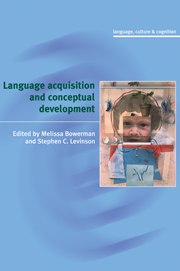Book contents
- Frontmatter
- Contents
- Preface
- Introduction
- Part 1 Foundational issues
- Part 2 Constraints on word learning?
- Part 3 Entities, individuation, and quantification
- Part 4 Relational concepts in form–function mapping
- 13 Emergent categories in first language acquisition
- 14 Form–function relations: how do children find out what they are?
- 15 Cognitive–conceptual development and the acquisition of grammatical morphemes: the development of time concepts and verb tense
- 16 Shaping meanings for language: universal and language-specific in the acquisition of spatial semantic categories
- 17 Learning to talk about motion UP and DOWN in Tzeltal: is there a language-specific bias for verb learning?
- 18 Finding the richest path: language and cognition in the acquisition of verticality in Tzotzil (Mayan)
- 19 Covariation between spatial language and cognition, and its implications for language learning
- Author index
- Subject index
14 - Form–function relations: how do children find out what they are?
Published online by Cambridge University Press: 26 January 2010
- Frontmatter
- Contents
- Preface
- Introduction
- Part 1 Foundational issues
- Part 2 Constraints on word learning?
- Part 3 Entities, individuation, and quantification
- Part 4 Relational concepts in form–function mapping
- 13 Emergent categories in first language acquisition
- 14 Form–function relations: how do children find out what they are?
- 15 Cognitive–conceptual development and the acquisition of grammatical morphemes: the development of time concepts and verb tense
- 16 Shaping meanings for language: universal and language-specific in the acquisition of spatial semantic categories
- 17 Learning to talk about motion UP and DOWN in Tzeltal: is there a language-specific bias for verb learning?
- 18 Finding the richest path: language and cognition in the acquisition of verticality in Tzotzil (Mayan)
- 19 Covariation between spatial language and cognition, and its implications for language learning
- Author index
- Subject index
Summary
Human languages, broadly speaking, provide two kinds of meaningful elements, using both to create grammatical constructions. On the one hand, there are morphemes that make reference to the objects and events of experience, and on the other, there are morphemes that relate these bits of experience to each other and to the discourse perspectives of the speaker. Linguistic theories of all stripes honor this duality, using such distinctions as “material content” vs. “relation” (Sapir 1921/1949), “lexical item” vs. “grammatical item” (Lyons 1968), or, most commonly, “content word” vs. “function word” (or, to include both free and bound morphemes, “functor”). Typically, the first class includes nouns and verbs, and usually also adjectives; the second class includes free morphemes such as conjunctions and prepositions, and bound morphemes, such as affixes marking such categories as number, case, tense, and so forth. It has generally been claimed that: (1) functors express a limited and universal set of meanings (“grammaticizable notions”), and (2) functor classes are small and closed, while content word classes are large and open. The first claim has led to proposals that the set of meanings is, in some sense, “prespecified” for language; the second has led to proposals that this collection of morphemes plays a critical role in both the acquisition and processing of language.
- Type
- Chapter
- Information
- Language Acquisition and Conceptual Development , pp. 406 - 449Publisher: Cambridge University PressPrint publication year: 2001
- 97
- Cited by

